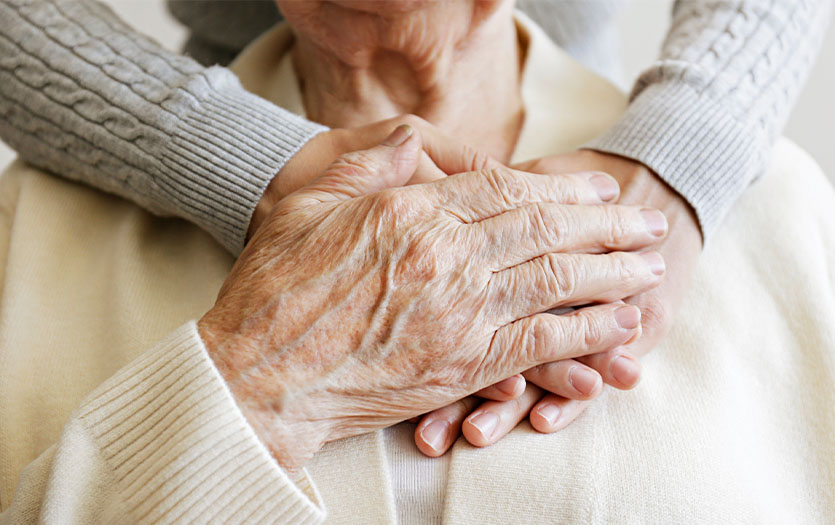The primary goal of hospice is to ensure that the end-of-life process is as comfortable and peaceful as possible for patients, caregivers, and loved ones. Yet deciding when to start this supportive care can be a difficult and overwhelming process. Below, we discuss the potential benefits of hospice and answer some common questions regarding this area of medicine.
What is palliative care?
Palliative care provides medical services, emotional support and spiritual resources to people in the later stages of an incurable illness, such as cancer or Alzheimer’s disease. Palliative care also helps family members deal with the practicalities and emotional challenges of caring for someone at the end of life.
A common misconception about starting hospice is that it is a last resort. Many people also believe that hospice means a lower level of medical care when in reality it is a specialized form of care that focuses on improving the quality of the patient’s remaining days, the instead of continuing treatment to prolong life. The primary goal of the hospice is to keep patients as comfortable as possible during their final moments. Palliative care strives to give patients and their families as much control and dignity as possible over their time together.
Who provides palliative care?
Palliative care services are provided by a group of dedicated caregivers made up of medical professionals, volunteers and spiritual advisors. The services they offer may include:
- Basic medical care focused on pain management and symptom control.
- Access to a member of the palliative care team 24 hours a day, 7 days a week.
- Medical supplies and equipment, as needed.
- Advice and social support for the patient and his relatives.
- Guidance with the complex challenges of life completion and closure.
Additionally, Parkview Home Health and Hospice uses a team approach, providing patients and their loved ones with the support they need to navigate every moment of their palliative care journey. Whether at home or in a facility, patients and families can find comfort and guidance from the following team members:
- Personal doctor
- Medical director of the hospice
- Registered nurse
- Home health aide
- Social worker
- Chaplain
- Volunteers
- Pharmacist
- Massage therapists, occupational therapists, physiotherapists and/or music therapists
Parkview’s palliative care team will also adjust a patient’s care plan as their situation and needs change. Many people worry about losing contact with their regular doctor, but we are taking steps to prevent this from happening by working with their primary care provider and coordinating care.
What steps should a person follow to prepare for hospice?
Choosing palliative care can be an overwhelming and difficult decision, but patients and their loved ones can take steps to prepare and become familiar with this new chapter.
- Prepare a list of advance directives. These are instructions for a patient’s provider and family members. They let them know what kind of care a person wants if they can’t talk or express themselves.
- Understand their coverage. Before finalizing their decision, patients or caregivers will need to know if their health insurance covers palliative care.
- Locate local resources. Patients and caregivers will want to find local palliative care programs and a care team to work with them and collaborate with their doctor, state health department, and insurance company.
- Choose their palliative care services. Knowing what a patient wants before entering a palliative care program can benefit everyone involved.
Other issues and aspects of care that patients should think about when preparing for hospice should include:
- Who do you want decisions about your medical care to be made?
- What are your biggest fears and anxieties around the end of life?
- Where would you rather spend your last months, days or moments?
- Do you want to make organ donation a priority?
- Do you have any particular wishes regarding rites or religious practices?
Who can patients and caregivers turn to for help?
If you have any questions or would like more information about hospice and hospice services or referring a patient to Parkview Hospice, please call 260-373-9800 or 800-363-9977. You can also complete our online form here. We are happy to answer your questions and walk these paths with you.
Useful resources
For more information on palliative care, check out these posts on the Parkview Dashboard blog:
Minimize fear and anxiety around end of life
An open dialogue on end of life and palliative care
The value of palliative care
A team approach to palliative care
Lifelong connections made through palliative care
A touch of healing
Simple Strategies to Soothe a Loved One
Help from a hospice chaplain
Making the Most of End-of-Life Conversations
Understand the dying process
Copyrighted material adapted with permission from Healthwise, Incorporated. This information does not replace the advice of a doctor.
